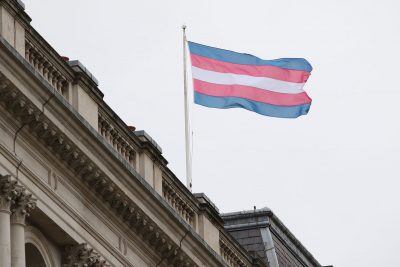
About 20 members of the BU community gathered together to hold a vigil for International Transgender Day of Visibility on Sunday afternoon in the Center for Gender, Sexuality and Activism in the basement of the George Sherman Union.
The purpose of the vigil, according to CGSA public relations coordinator Ethan Liu, was to commemorate transgender victims of violence, as well as recognize the progress made by trans individuals thus far in the fight for equality.
“The importance of this event and others like it is to recognize and inform others about the struggles of transgender individuals and tell others how it is important to not just be passive allies but active allies, working together with each other to better this community,” Liu wrote.
Liu also wrote as far as they were aware, Sunday’s event honoring trans visibility was the first of its kind at BU.
“BU is severely lacking in support of the LGBTQ+ community, especially transgender and gender non-conforming individuals,” Liu wrote.
The vigil was originally supposed to be held in Marsh Plaza, but was changed last minute to the CGSA space due to rain.
Activist Maureo Fernández y Mora spoke at the vigil about their journey as a Chicano, transgender individual and touched on their personal struggle with making the difficult choice between visibility and safety.
“As a trans person, I spend a lot of time trying to balance really wanting to be seen authentically in the world and that also being a really scary process,” Fernández y Mora said. “For a long time, I tried to fight against some of my own gender expression that would have felt really good and natural because I reasonably feared both physical and emotional violence on both an interpersonal and a state level, and that felt like a real sacrifice to make.”
While talking about the ongoing threats of physical and emotional violence against transgender people today, Fernández y Mora acknowledged the strides trans elders — such as Miss Major Griffin-Gracy, Marsha P. Johnson and Sylvia Rivera — made years ago that benefit today’s youth.
“I know that I owe [my] life to women, men and non-binary trans elders and their absolute bravery and commitment to their truth above all else,” Fernández y Mora said, “unfortunately including physical safety and material resources.”
Fernández y Mora went on to discuss many other pressing issues concerning the transgender community, such as passing, politics and transphobic violence.
“One of the many reasons that gender violence, specifically towards trans people, exists is people who haven’t thought critically about their own gender get really scared when someone else does,” Fernández y Mora said, “because that means that all of the messaging that they took for granted might not be 100 percent accurate.”
Fernández y Mora said they really struggle with the concept of trans visibility and touched on dangers that accompany hyper-visibility.
“They [perpetrators of trans violence] feel like we’re encroaching on all of the space they’ve already been given to embody themselves,” Fernández y Mora said.
iO Fields, a sophomore in the College of Arts and Sciences who attended the vigil, said Fernández y Mora did a great job of discussing visibility, particularly how the visibility of one trans person can help other trans people.
“It’s obviously layered — the idea of trans visibility,” Fields said. “But at a very basic level, representation is so important in a way that self-esteem and self-concept even psychologically is developed and understanding there are people that look like you and have lived like you and feel the same pain and really deep joy that you do is so important.”
Fields also expressed appreciation for how Fernández y Mora focused on intersectionality and the life-threatening efforts that trans women and femmes of color made for the benefit of the community as a whole.
Eli Panetta, a freshman in CAS, said part of the reason he attended the vigil was to honor those who had passed away.
“I have lost a friend in the trans community, and I wanted to take a break from my studying to pay some respects,” Panetta said. “I also wanted to support those in the trans community at BU who are personally affected by the weight of today.”
While International Transgender Day of Visibility provides a much needed time for reflection, Panetta said, it is a time for celebration and community building.
“Everyone is at different points of transition, and this day celebrates everyone no matter where they are,” Panetta said. “Personally, it’s just a day where I can look at all the things I have accomplished as a trans individual when it feels like the odds are often stacked against me in cis-controlled spaces.”
Joe Guptill, a sophomore in the College of Communication, said he attended the vigil to show his support as an ally of the trans community.
“I want to support my trans brothers and sisters because they have always been part of my life growing up,” Guptill said. “It’s a specific day to set aside and think about them and celebrate them.”
Drew Powell, a sophomore in the College of General Studies, said trans visibility is important because it gives people like the trans community role models.
“For me personally,” Powell said, “the visibility of other transmasculine people of color is what made me feel like, ‘I’m gonna be OK. I’m not alone.’”















































































































